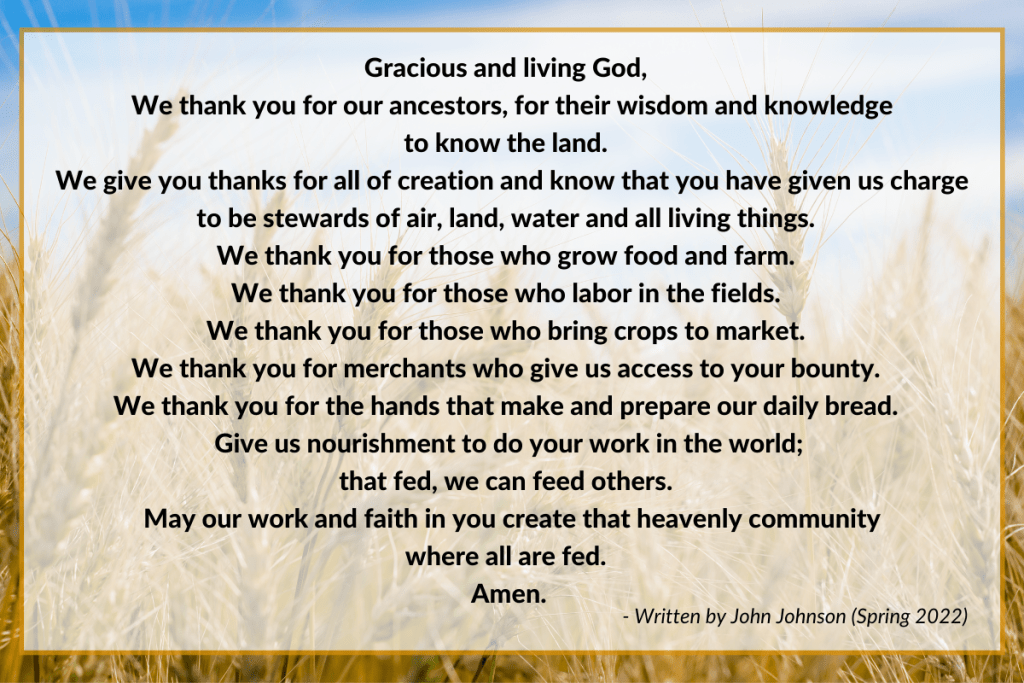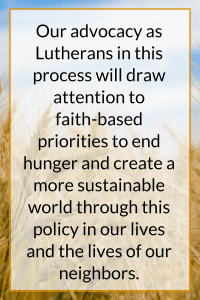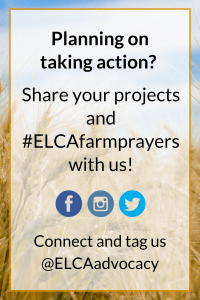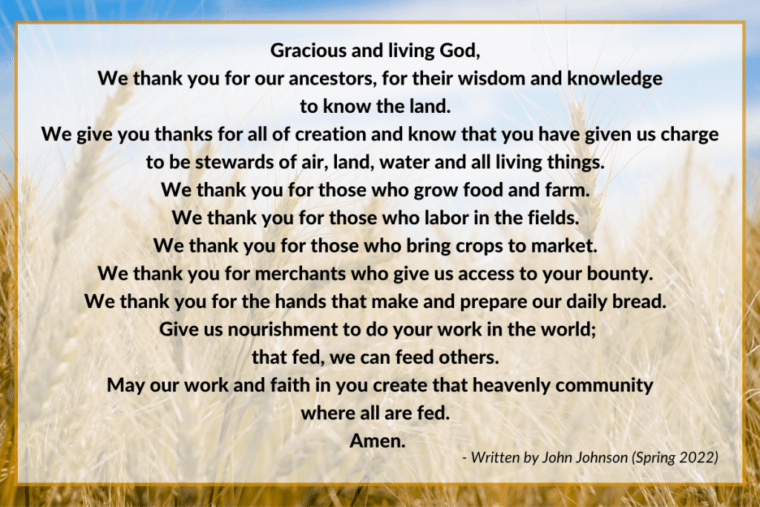This blog is an invitation into learning more about the farm bill, farm bill advocacy and ways to get involved. It expands on information in the ELCA World Hunger’s Global Farm Challenge Youth Action Guide’s advocacy page.
 The farm bill is legislation passed every five years that has a tremendous impact on hunger in the United States and globally. The current farm bill expires in 2023, so the process is ramping up – where the programs covered in the bill are debated, refreshed and ultimately passed by Congress toward being signed into law. Now is the time for our input and advocacy to shape the next farm bill with priorities that draw us closer to a world where all are fed!
The farm bill is legislation passed every five years that has a tremendous impact on hunger in the United States and globally. The current farm bill expires in 2023, so the process is ramping up – where the programs covered in the bill are debated, refreshed and ultimately passed by Congress toward being signed into law. Now is the time for our input and advocacy to shape the next farm bill with priorities that draw us closer to a world where all are fed!
These are empowering words from John Johnson, ELCA Program Director for Domestic Policy: “You don’t have to be an expert [to do advocacy], you just need to care .” Recognizing, though, that a better understanding of the policy you are advocating on will boost your confidence, let’s dig in. What exactly is the farm bill, and why is it important?
What is the farm bill?
The farm bill is an omnibus bill, meaning it has several different parts all joined together in a single bill. Some of the different aspects of the farm bill include:
- Nutrition
- International Food Aid
- Rural Development
- Environmental and Land Conservation
- Research and Development
An ELCA farm bill resource was prepared in 2018 which breaks down the different components of the bill, and what the ELCA was advocating for within the bill, including honoring land claims by Indigenous Peoples. An update for 2023 will be posted to ELCA.org/resources/advocacy, but many of the basics are the same. If you are interested in a more in-depth history of the bill, “The History of the United States Farm Bill ” from the Library of Congress is a great place to start and includes many archived photos.
” from the Library of Congress is a great place to start and includes many archived photos.
Why does the farm bill matter?
The farm bill affects everyone. This policy connects to your community locally and globally, such as healthy food access for low-income families, food waste reduction, conservation practices, rural development and much more. The ELCA supports a farm bill that will promote a strong and resilient food-supply chain and provide needed nutrition through domestic and international programs. Our advocacy as Lutherans in this process will draw attention to faith-based priorities to end hunger and create a more sustainable world through this policy in our lives and the lives of our neighbors.
Take Action
✓ Sign up for the ELCA Advocacy Network.
The farm bill is still in the preparatory phase. Sign up here for the network to get alerts so that you can take action at critical points during the bill’s development and find out about advocacy actions in other areas of interest.
✓ Write your own Farm Bill prayer.
Reread the prayer at the beginning of this blog. Think about the different parts to it, and how many people are involved in bringing food to our plates. Create a list of at least 10 different jobs involved in bringing food to the table. Using the prayer as a template, write your own prayer about your community, naming people and professions involved in the process. Ask your worship leader to use it during the Prayers of the People in your next worship service. Share your prayer on social media using #ELCAfarmprayers and tag us @ELCAadvocacy.
✓ Visit a farm.
 Connect with a local farmer or rancher to talk to them about their work. You can ask them questions about how the farm bill affects them. You can use this story and what you learn when you write to your legislator about farm bill priorities. Don’t forget to thank them for their work!
Connect with a local farmer or rancher to talk to them about their work. You can ask them questions about how the farm bill affects them. You can use this story and what you learn when you write to your legislator about farm bill priorities. Don’t forget to thank them for their work!
✓ Get to know your representatives.
Building relationships with your representatives is important. Use House.gov to find your congressional representative. Write an email introducing yourself and your interest in the farm bill, and ask them what their priorities in the farm bill are.
✓ Lead a service project.
Invite your youth group or congregation to study hunger facts (like “Fact Sheet: Hunger Is a Racial Equity Issue” and other tools at ELCA.org/resources/advocacy).
Make connections to impacts of policy with a service event like a soup super, garden planting, refugee assistance or other activity.
Check to see if your congregation, synod or an ELCA-affiliated state public policy office offers activities you can join supporting justice, hunger relief or creation care – and participate (or start one!).
✓ Connect with us.
Have questions for us or just want to connect with someone to learn more about advocacy? You can email washingtonoffice@elca.org or follow us on social media @ELCAadvocacy.

